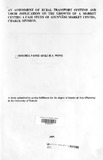An assessment of rural transport systems and their implication on the growth of a market centre: a case study of Adungosi market centre, Chakol division

View/
Date
1997Author
Mogoria, Naomi Apali
Type
ThesisLanguage
enMetadata
Show full item recordAbstract
Transport plays a major role in development and for any rural area, the transport
network must be developed and improved. However this development does not take off
evenly in all parts of the rural areas, since there are nodal points for rural development.
Therefore market centres can be points of development, especially when provided with
good transport network.
The main purpose of this study was to assess the relationship between rural transport
systems and the development of market centres. It was a case study and was more
specifically concerned with five objectives; to assess the various types of
socio-economic activities carried out in the study area, to identify the transport modes
used, to assess the role of Malaba-Busia road in the economic development of the
immediate region, examine the nature and magnitude of transport problems faced and
finally make recommendations towards the improvement of rural transport systems in
the study area.
The study area chosen was Adung'osi market centre in Chakol Division of Teso
District. The are,a. was chosen as a representative of the four market centres in the four
divisions found in Teso District, mainly because it is situated along the Busia-Malaba
road corridor, and this location would enable to answer the question of how the
transport network would affect development of a rural area, with specific reference to a
market centre.
Two types of data were collected which were primary data and secondary data.
Descriptive methods of data analysis such as mode, mean, percentages and frequency
were used. The population of traders was sampled through simple stratified random
sampling and the matatu manambas through simple random sampling. Interview
schedules and discussions were held for boda-boda operators and key government
officials.
The findings of the study revealed that, there are mainly small-scale businesses (retail)
and not large scale business operations,in the study area which is partly attributed to
transport problems faced by the traders such as poor road conditions, skewed public
transport, inadequate terminal facilities, lack of public transport modal choice, and
unregulated and unreliable transport services. This has led to the increase in the
operation of informal paratransit mode of transport popularly known as "boda-boda'
The study reco~ends that there is need for the institutional framework put in place to
deal with transport issues to improve rural transport by maintaining the Rural Access
Roads, to regulate the boda-boda, and have proper co-ordination between the
government and NGOs by providing credit to the traders and boda-boda operators III
the study area.
Citation
Master of arts in PlanningPublisher
University of Nairobi Department of Urban and Regional Planning
